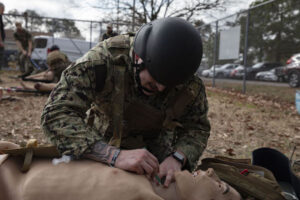
Story by Petty Officer 2nd Class Travis Decker
Naval Medical Forces Atlantic
Two Sailors from Naval Medical Forces Atlantic (NMFL) joined other commands in the Hampton Roads area to attend a “Trainer the Trainer” Tactical Combat Casualty Care (TCCC) Tier 3 pilot course on board Naval Support Activity (NSA) Hampton Roads – Portsmouth Annex, Jan. 26.
The enhanced course provides several new areas of training, such as medication familiarization and documentation, tactical evacuations and reporting, and a blood management course. The new course also incorporated feedback from providers, students and instructors that resulted in a new curriculum and restructure of TCCC to incorporate Sailors from outside of Navy Medicine.
“I feel very confident in the program and its direction,” said Hospital Corpsman 1st Class Nicolas Brown, a native of Genoa, Ohio, a Training and Administration of Reserve (TAR) Sailor, and the NMFL assistant regional reserve program director. “It’s giving the students more in-depth and digestible knowledge. The final exam is more physical and more hands-on training, because of that the students are more confident in the doing the tasks they need to do.”
First developed in 1996, TCCC serves as the Department of Defense standard of care for non-medical and medical first responders. DOD and NATO allies require TCCC training for deploying forces because it combines effective tactics and medicine.
“They’ve split TCCC up into four tiers now,” explained Chief Hospital Corpsman Tianna Blackmon, a native of Chesapeake, Virginia, an active duty for operational support reservist and the NMFL regional reserve program director. “If we have more people trained in first aid and medicine, the better we can be prepared down range and the more lives we can save.”
The TCCC Tier 1 All Service Member training is designed to provide basic lifesaving skills for non-medical service members at their duty stations or in preparation for non-combat deployments. The Combat Lifesaver course, TCCC Tier 2, is primarily for designated non-medical personnel tasked to provide additional medical support within their units during sustained combat or contingency operations. Tier 3 is combat medic course designed for medical personnel and some licensed practitioners.
“We have been working in conjunction with the Defense Health Agency’s Joint Trauma System to develop and implement a tiered system that introduces and reinforces life-saving self-aid, buddy-aid and field trauma care to our partners across the fleet, both active and reserve,” concluded Cmdr. Travis Storey, the NMFL director for education and training. “These training objectives appropriately prepare our forces for identified challenges of future engagements and conflicts.”
The combat medic course TCCC Tier 3 is available in select locations, and Tier 4 is in development by DHA’s JTS. Tier 4 will be designed for advanced medical personnel and licensed practitioners. It will include prolonged advanced field care for injured service members, including special operations and search and rescue forces.
NMFL, headquartered in Portsmouth, Virginia, delivers operationally focused medical expertise and capabilities to meet Fleet, Marine and Joint Force requirements by providing equipment, sustainment and maintenance of medical forces during combat operations and public health crises. NMFL provides oversight for 21 NMRTCs, logistics, and public health and dental services throughout the U.S. East Coast, U.S. Gulf Coast, Cuba, Europe, and the Middle East.
Navy Medicine – represented by more than 44,000 highly-trained military and civilian health care professionals – provides enduring expeditionary medical support to the warfighter on, below, and above the sea, and ashore.